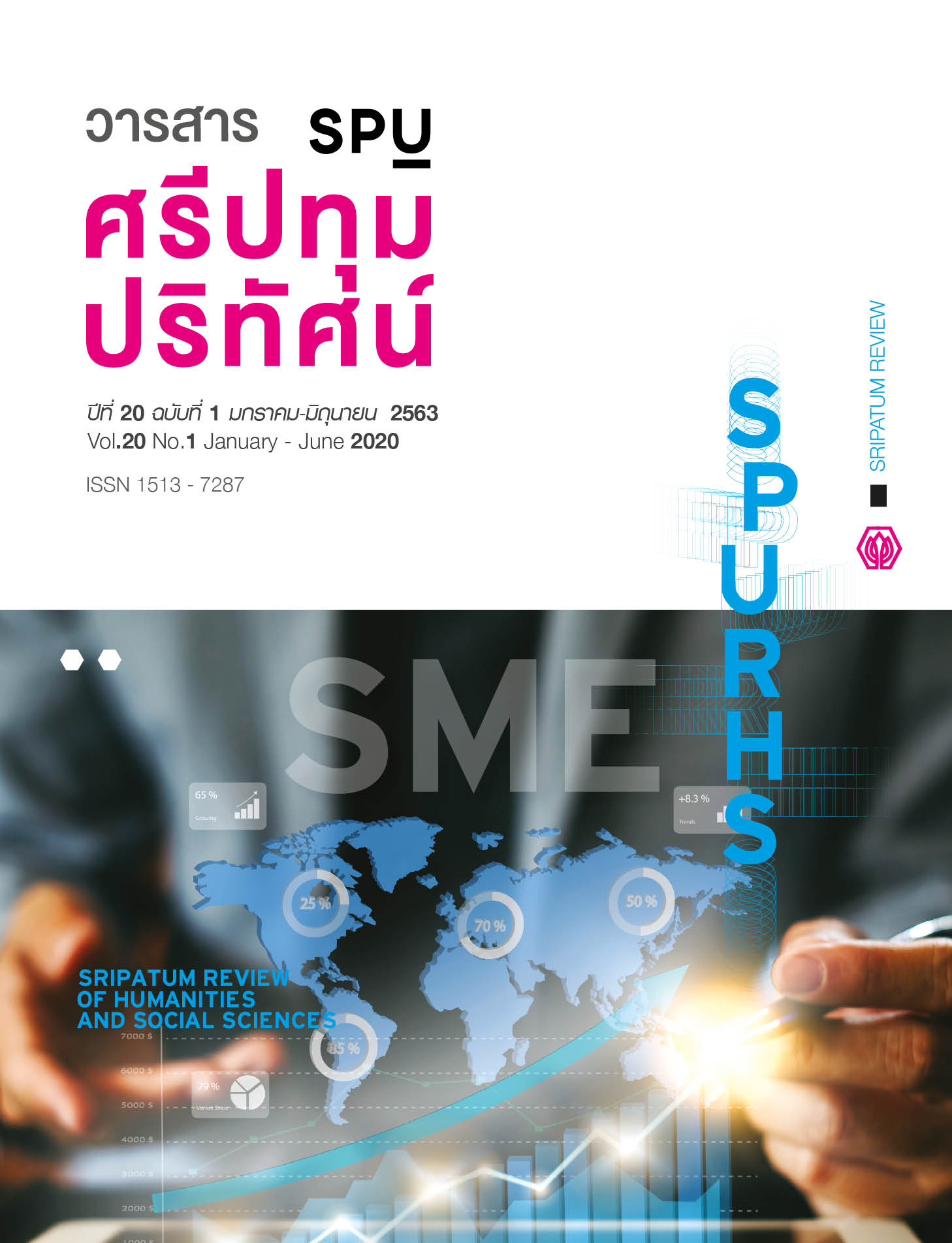A Study of the Approach for Promoting Student’s Characteristics Based on the Twelve Core Values of Thai People
Main Article Content
Abstract
This research aimed to study the approach for promoting student’s characteristics based on the twelve core values of Thai people. The key informants were eleven experts involving with learners in primary schools, secondary schools, and universities. The research instruments were an in-depth interview form and a focus group note taking form. The data from the interviews and focus group discussion were analyzed with content analysis. The results of the research revealed that there were seven approaches for consideration in promoting student’s characteristics: (1) the importance of student’s characteristics based on the twelve core values of Thai people; (2) the method/process for evaluating the student’s characteristics; (3) the norms of the scales to assess student’s characteristics based on the twelve core values of Thai people; (4) the guidelines for development and characteristics of the manual; (5) the promotion of student’s characteristics based on the twelve core values of Thai people; (6) the taking of the assessment results of student’s characteristics based on the twelve core values of Thai people to be applied in developing and promoting students and techniques that help to promote the twelve core values; and (7) the factors that have roles in assessing and developing student’s characteristics based on the twelve core values of Thai people. The results of this research can be used as the approach for designing activities to develop student’s characteristics to be in accordance with the twelve core values of Thai people. As such, in designing the activities, the different characteristics and contexts of students should be taken into consideration.
Article Details
1. กองบรรณาธิการสงวนสิทธิ์ในการพิจารณาและตัดสินการตีพิมพ์บทความในวารสาร
2. บทความทุกเรื่องจะได้รับการตรวจสอบทางวิชาการโดยผู้ทรงคุณวุฒิ แต่ข้อความและเนื้อหาในบทความที่ตีพิมพ์เป็นความรับผิดชอบของผู้เขียนแต่เพียงผู้เดียว มิใช่ความคิดเห็นและความรับผิดชอบของมหาวิทยาลัยศรีปทุม
3. การคัดลอกอ้างอิงต้องดำเนินการตามการปฏิบัติในหมู่นักวิชาการโดยทั่วไป และสอดคล้องกับกฎหมายที่เกี่ยวข้อง
References
Aphipanyo, S. and Wangsuwan, N. (2010). The Construction and Development of Model for Youth’s Violent Behaviors Adjustment According to Buddhist Approach (Research Report). Phra Nakhon Si Ayuthaya: Mahachulalongkornrajavidyalaya University. (in Thai)
Choothong, W. Suksawat, J. and Na Ranong, L. (2017). The Effects of Using a Guidance Activities Package Based on Modeling Technique to Develop Public-Mindedness of Lower Secondary Students at Ban Teng (Rueanchoonprachasan) School in Phatthalung Province. Journal of Education Prince of Songkla University, 28(3), 72-82. (in Thai)
Eiamsupasit, S. (2019). Theory and Techniques in Behavior. 9th ed. Bangkok: Chulalongkorn University Press. (in Thai)
Geena, Y. and Geena, R. (2018). Morality of 12 Basic Values Promoting Model of Mae Sa School, Mae Rim, Chiang Mai. [Online]. Retrieved December 8, 2019, from:http://repository.rmutr.ac.th/bitstream/handle/123456789/724/rmutrconth_78.pdf?sequence=1&isAllowed=y (in Thai)
Innsa, K. Ruannakarn, P. and Piromjitpong, S. (2016). Factors Affecting to Mattayomsuksa 3 Student’s Disciplines under Udonthani Education Service Area Office. Journal of Educational Measurement Mahasarakham University, 22(Special), 39 - 48. (in Thai)
Kloydee, W. Thongtab, S. and Intrakuncid, P. (2015). Strategies for Driving 12 National Core Values into Implement in Basic Education Schools. National Defence Studies Institute Journal, 6(2), 57 -67. (in Thai)
Miles, M. B. and Huberman, A. M. (1994). Qualitative Data Analysis an Expanded Sourcebook. Thousand Oak; CA Sage Publication.
Ministry of Education. (2014). The 12 core values of Thai people according to the NCPO policy. [Online]. Retrieved January 8, 2020, from: http://www.moe.go.th. (in Thai)
National Reform Council (2015). Agenda 4: Agenda for values, morality, ethics for good citizenship and perfect humans. Secretariat of the House of Representatives. [Online]. Retrieved Jan 8, 2020, from: https://www.parliament.go.th/. (in Thai)
Panich, J. (2013). Development Learning into the 21st Century. Bangkok: Siam Commercial Foundation. (in Thai)
Prayartsub, P. and Suriyachaivatana, P. (2015). The School Administrators’ Roles on Learner Characteristic development toward world-class standard school under the secondary educational service area office 4 Pathumthani Province. VRU Research and Development Journal of Humanities and Social Science, 10(2), 89-99. (in Thai)
Suandusitpoll, Suan Dusit University. (2015). Poll supports 12 values, focusing on patriotism, monarchy. [Online]. Retrieved Jan 15, 2019, from: https://mgronline.com/daily/detail/9570000111607. (in Thai)
Suksawat, S. and Namsomboon, M. (2017). The Development of Patriotism Religion and Monarchy Values using Value Clarification Process of Matthayomsuksa 5 Students. Veridian E-Journal (Humanities, Social Sciences and Arts), Silpakorn University, 10(2), 1040-1059. (in Thai)
Yayod, I. (2017). A Management Model to Develop Desirable Characteristics of Students with the Use of Boy Scout Activities. Sripatum Review of Humanities and Social Sciences, 17(2),80-90. (in Thai)


